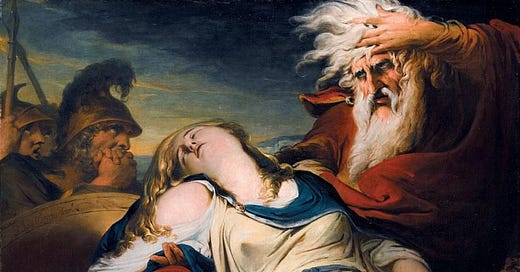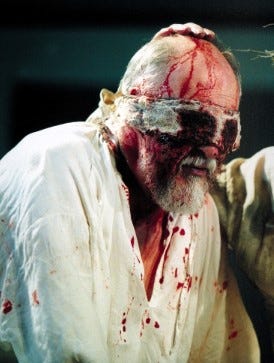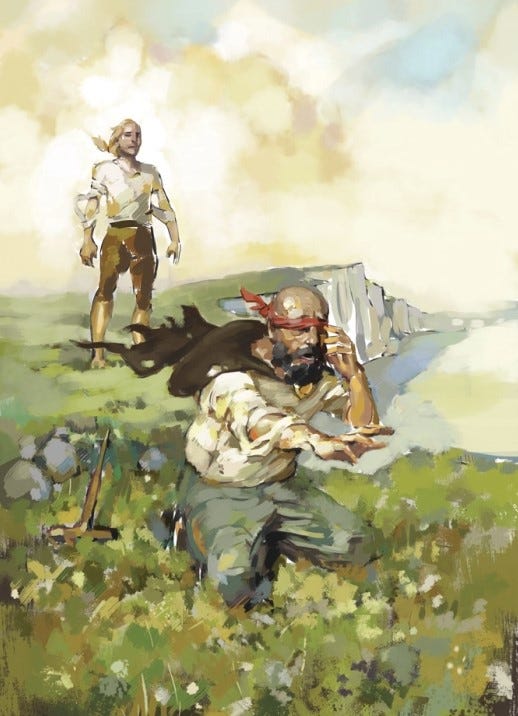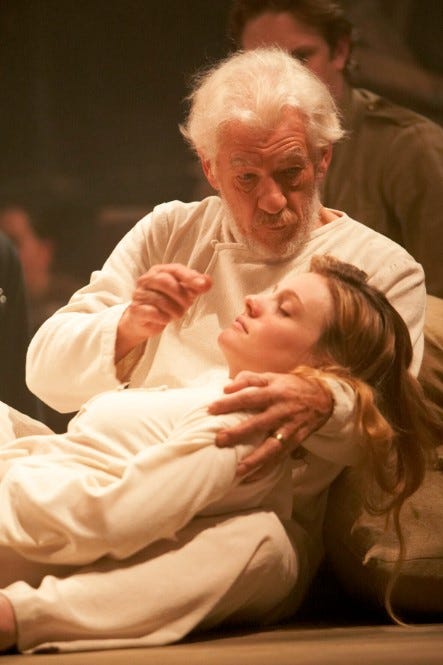King Lear is often regarded as Shakespeare’s most depressing, pessimistic and cynical play. This perception is likely the reason why for centuries the text has been censored and changed, with a once popular version giving it a comedic ending, with a wedding between Cordelia and Edgar.
However, like Goddard, I too believe the pessimistic reading is hasty and superficial, and necessary only if you bring the pessimism in with you as a reader. A trustful Christian will find find that the play is in fact Shakespeare’s most religious, most faithful, and most hopeful. This holds true both in terms of the Christian morality the play vouches for, and in terms of the metaphysics it reveals.
Instruments to plague us
The blinding of Gloucester is a famous scene often balked at, censored, and thought unnecessarily gruesome. The scene is indeed hard to stomach, but it serves an important moral purpose, and signifies a divine chastisement.
To understand the nature of the chastisement, we must first ask how did Gloucester come to meet such a fate? He had a treacherous son Edmund, who betrayed him to his enemies.
Why did Edmund betray his father (and his brother)? Because he was a bastard, and Shakespeare knew there is always something dark in bastardy.
Why was Edmund a bastard? Because Gloucester had fornicated.
At first glance this reading may perhaps appear moralistic or purpose driven, but it has the full backing of Shakespeare – and of Edgar, his righteous mouthpiece. In the following Edgar speaks to his bastard brother, revealing his concealed identity:
“My name is Edgar, and thy father’s son. The gods are just, and our pleasant vices
Make instruments to plague us: The dark and vicious place where thee he got
Cost him his eyes.”
The theme of fornication is a recurring one for Shakespeare. Measure for Measure is centered wholly around the theme, and in King Lear it underlies major elements of the drama. Fornication is what causes the downfall of a generally kind and good man, Gloucester. As said, it is the back-ground story behind the creation of the main villain, Edmund. Fornication is also shown to be one of the pastimes of the wicked. Edmund uses illicit sex to manipulate the wicked sisters, Regan and Goneril. They chase him and unconsciously serve his purposes, while sating their lusts.
Another consequence of fornication is the loss of vision. In Gloucester’s case Shakespeare makes this painfully obvious. But it is true also with the wicked sisters. Their illicit acts cause them to lose sight from what’s really happening around them. They are being played, they are being driven to destruction.
Considering all this, it becomes clear there was always something prudent behind all the warnings parents and grandparents gave their children concerning masturbation making you blind (the act understood as a kind of primal form of fornication). Not organically blind, but spiritually and morally blind.
The Christian view is that sex outside marriage results in a form of spiritual bondage. You paradoxically shackle yourself by trying to free sex from bounds and of responsibility. You become the servant of your lusts, and the growing catalogue of sexual sins becomes ever harder to admit to and repent.
The wicked irony is how fornication twists something that should be generative and constructive into something barren and destructive. Even when the act results in some fruit, such as an illegitimate son like Edmund, the harvest is revealed to be of bitter stock and of dark ramifications.
I stumbled when I saw
Some dare to call the play a prime example of Shakespeare’s supposedly unprovidential view of the world and human affairs. But against chains of evens such as the ones described above, how can such a reading be maintained? After all, no one who believes in providence argues that there is no evil and chaos in the world. Rather, we say the human chaos is the result of people behaving in an unrighteous manner – operating against and outside the will of God.
In the play, Shakespeare offers us a series of utterly damnable people, who only ever follow their own prerogatives. Edmund, Regan, Goneril, Cornwall. In each case the audience gets to witness how evil cannot create, it can only destroy. Evil is always hungry in its barrenness, and ends up devouring itself, time and again.
Shakespeare also depicts sinners who end up redeemed: Gloucester, and of course Lear himself. In this respect too, the play is thoroughly Christian. Suffering is shown to be not a problem, but the answer. It is through suffering that we are redeemed. This is certainly true with Edgar and Gloucester, who although basically good men by character, are both lifted to another level of spiritual understanding after being betrayed by Edmund.
Edgar becomes the most direct representative of Christ in the play, offering the audience some key teachings from our Lord, only put in the Shakespearean mode:
“Yet better thus, and known to be contemned, than still be contemned and flattered.
The lowest, the worst, and most dejected thing of fortune, stands still in esperance,
Lives not in fear. The lamentable change is from the best, the worst returns to laughter.”
Is this not simply a rephrasing of the gigantic words, “The first shall be last, the last shall be first.”
So strong is the loving power of Edgar, that he is able to rescue his father from the deepest pit of despair and suicide. The blinded man who sees no point and purpose in his life, and wishes to make a quick end of it, is turned around altogether by his son’s patient guidance. The father is converted by his son. Converted – and in a sense even exorcised of a demon. Demonic imagery is a key part of the play, and Gloucester’s despair is given the air of possession, which his righteous son frees him of. The spiritual turnaround is immense. The man begins by attempting suicide, saying:
“As flies to wanton boys, are we to the gods, They kill us for their sport…. I have no way, and therefore want no eyes; I stumbled when I saw.”
That is where he starts at, but after some keen guidance from his son, all has changed:
“You ever-gentle gods, take my breath from me; Let not my worser spirit tempt me again to die before you please! ….
Henceforth I’ll bear affliction till it do cry out itself ‘Enough, enough,’ and die.”
Edgar’s Christ-like reply to his father’s amendment hits deep, like a true blessing: “Bear free and patient thoughts.”
This same basic dynamic of course also holds with the King, who begins the play as a haughty, vain, selfish, prideful man, blind to the obvious good and evil around him. After all the betrayals, sufferings, deep mental anguish and confusion, in his final moments Lear becomes king not only in rank, but in character. His vision is turned outside of himself, to look at others, at their good, and and at their sufferings. The Lear we witness at the end lives up to the noble, Christian character of the institution.
The King only gains this increased understanding by losing his sanity. The development echoes the words of St. Paul, and the Christian notion of the Divine Fool – of Christianity itself being a form of madness in the eyes of the World. Only through such madness can you become wise. In Lear’s case the insanity is quite literal, but it is only his madness that can break all the ossified preconceptions, his hardened self-image, his pride, his vanity, his selfishness. As with Don Quixote, going mad opens his eyes to deeper and truer realities. His material understanding may crumble for a time, but by it he gains spiritual vision.
You are a Spirit
Perhaps most remarkably, Shakespeare also gives us a number of solidly virtuous men who prove that a righteous life is no pipe dream. Were all men so, all our lives would constitute big comedies. It is good to keep in mind that in Shakespeare tragedy results from lack of righteousness – chaotic, impious, selfish acts that go against what is Right and properly ordered. The virtuous characters in King Lear remind us of the powerful effects righteousness can generate in your life and in the lives of others, even amid all the chaos caused by sin.
Virtuous Cordelia is perhaps the most famous example of these characters, but there are others like the Fool, and especially the three who gather to mourn the King at the very end: Kent, Edgar, and Albany.
Kent represents the virtue of utmost loyalty. Loyalty that dares to rebuke a friend when they are making a mistake. Loyalty that remains unbroken even when the friend falls away from virtue. Loyalty that cares not for reputation or position, but is willing to sink deep just to help. He also represents the earthly man, the pagan man, for whom friendship is all. Ultimately Kent’s secular outlook bars him from seeing the ultimate truth, and the play’s ending gives him despair instead of hope. In this he represents the Modern man, and perhaps the average reader.
“I have a journey, sir, shortly to go: My master calls me, I must not say no.”
Albany is my personal favorite in the whole play. In the beginning he seems like a bit of non-entity, a henpecked husband and a weak man. But in a powerful scene in the middle of the play he surprises the audience by unleashing a full-on barrage or reproof at his wicked wife. A supremely cathartic moment!
After that, the man becomes a figure of conflicted heroism and principle. He fights successfully for his country, does his duty, but in doing so is forced to side with the wicked. Albany is of robust heart, and the ending does not demoralize him like it does Kent. His mind immediately goes to securing a good rule for the realm, in the hands of two good men, Edgar and Kent:
“Our present business is general woe. – Friends of my soul, you twain Rule in this realm, and the gored state sustain.”
Edgar, the third man ‘at the foot of the Cross’, is a man of deep virtue, who through personal suffering gains truer vision and deeper understanding. Ultimately he redeems his despairing father and destroys the wicked aspirations of his bastard brother. Edgar understands reality more thoroughly than others, and thus his reaction at the apparent tragedy is one of trust and fortitude.
“The weight of this sad time we must obey.”
King Lear himself is bestowed a burst of insight that penetrates even deeper than Edgar’s. In the ending scene the king keeps hovering between hope and despair. Putting a feather against his dead daughter’s lips, he first shouts “She lives!”. While the assessment is quickly proved materially untrue, and hence disappointing, it is later shown that the disappointment was hasty.
Because Cordelia’s body is insurmountably dead, the King quickly sinks in the deepest bitterness, wondering why God allows horses, dogs and rats to live, while his sweet daughter is dead. But right after all that, what does the king realize, constituting his final words?
“Do you see this? Look on her, look, her lips, Look there, look there!”
What does this excited reaction signify? A pessimist reader would say it simply means that Lear is mad, and sees something that is not there, like earlier with the feather. But all the preceding scenes after him waking up after the storm have been illustrating the King’s regained and uplifted sanity. Why would his last words contradict all that? Furthermore, we must couple these words with Lear’s earlier line from Act 4. There the king is lying on his bed, looking at Cordelia:
“You are a spirit, I know.”
At the end of his life the King is given supernatural vision that allows him to see through all the apparent chaos and despair. What Lear sees in his final moment is the immortal soul behind the mortal body. A life everlasting. Edgar the Righteous trusts in hope. Kent the Pagan despairs. Lear the Christian dies of joy.
It has always been a vain and silly endeavor to compel King Lear into a happy ending by allowing Cordelia to survive and marry Edgar. Not because yearning for a happy ending is wrong, but because if our spiritual vision is keen enough, we come to understand that the extant play is already a comedy. Indeed, it is a version of the ultimate comedy that all our lives revolve around. The comedy of souls immortal and men redeemed.







